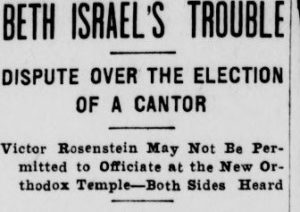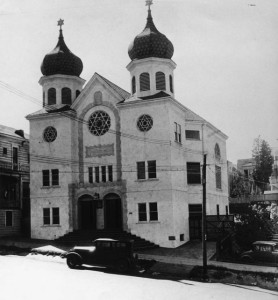Cantor Victor Rosenstein
Values Codes H – E – L
The life story of Victor Rosenstein is not well preserved. The little that remains tells of a struggling nineteenth-century cantor, floating from congregation to congregation, mistreated by temple boards, and never receiving the respect or remuneration he felt he deserved.
For a brief time during his unenviable career, Rosenstein sang at Congregation Beth Israel in Los Angeles, making him the first cantor to serve in that city.
– Jonathan L. Friedmann, A City Haphazard: Jewish Musicians in Los Angeles, 1887-1927
Victor Rosenstein was born in Russia in 1860.
As a teenager, he studied voice with celebrated baritone Salvatore Marchesi at the Vienna Conservatory of Music (c. 1875-1876, at 15 years of age).
Shortly thereafter, he was hired as cantor of the Great Synagogue in Leeds, England (1876-78, at 16 years of age), and then as “first reader” of the East London Synagogue, a position he held for ten years (1879-1889, starting at 19 years of age).
He was removed from that post for engaging in “conduct unbecoming a minister.”
Evidently, he refused to lead services on the second day of a chag (Jewish festival).
The synagogue paid his expenses to relocate to America.
Along the way . . . .
Cantor Rosenstein arrived in Philadelphia with his wife and two daughters in 1890.
There he served as Cantor of Temple Beth Israel (1890-1893) and Teshuath Israel (1893-1894).
In 1896, Rosenstein was appointed “hazzan” of Congregation Shaar Hashomayim in Montreal.
By 1899, he was working at Congregation Emanu-El in Vancouver.
Los Angeles
Cantor Victor Rosenstein next moved to Los Angeles, in part because the climate was better for his wife’s health.
He learned that Congregation Beth Israel (a.k.a. Olive Street Shul), a small Orthodox synagogue, had been operating without cantor or a rabbi.
Rosenstein initially assumed the pulpit at Beth Israel without pay.
His fine baritone voice so impressed the congregation that he was given a six-month contract, beginning in April of 1902.
That marked the first time a Cantor was hired by a Los Angeles synagogue.
But, things quickly went sour.
The circumstances are not entirely clear, but the Los Angeles Herald, which chronicled the controversy, offers some hints.
A number of congregants and board members opposed Rosenstein’s hiring from the start.
Beth Israel’s president told the newspaper: “I have never sat in the church [sic] while Rosenstein was officiating, and I do not think I ever will.”

Herald Examiner clipping about Cantor Rosenstein, May 26, 1902
Rosenstein was accused of claiming to be a rabbi, a charge he firmly denied.
Several congregants complained that his $300 salary for six months was exorbitant.
Rosenstein responded that it was well short of a good cantor’s fee: “I have been paid more than $300 for four days’ work.”
At one point, a prominent member offered him “$100 if he would leave the city.”
There was even a public protest:
Last Saturday morning the first service at the temple was largely attended. When Rosenstein rose to conduct the second part of the service three-fourths of the men present arose and withdrew to the basement, leaving scarcely enough members to close the service.
— Los Angeles Herald, July 9, 1902.
Cantor Victor Rosenstein resigned from Beth Israel on October 1, 1902, the day before Rosh Hashanah.
Rabbi Abraham Edelman, formerly of Congregation B’nai B’rith (today’s Wilshire Boulevard Temple), was brought in to conduct High Holiday services.
Cantor Victor Rosenstein died of a heart attack in Evansville, Indiana in 1903.
He was just 43 years old.
His widow and daughters resided in Vancouver, Canada at the time.
Source
- Jonathan L. Friedmann, A City Haphazard: Jewish Musicians in Los Angeles, 1887-1927 (Washington, D.C.: Academica, 2017).

